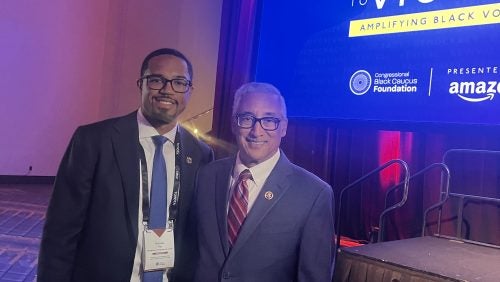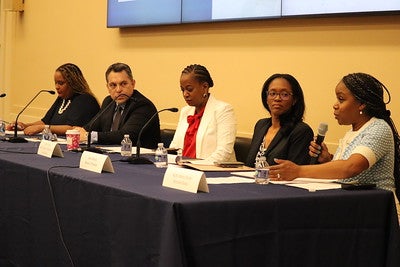Racial Equity in Education Law and Policy Clinic
Our Work
The Racial Equity in Education Law and Policy Clinic (REEL Policy Clinic) centers its work at the intersections of education law, racial equity, and legislative advocacy. Student attorneys explore the origins of racial inequities in education and the role of law in either eliminating or entrenching them. This work includes addressing issues that disproportionately impact the educational experiences and outcomes of students of color, including discriminatory school discipline practices, police presence in schools, school segregation, resource inequities, and educational approaches that focus on remediation of students of color.
The Clinic experience includes legislative lawyering on behalf of clients as well as a twice-weekly seminar that examines substantive issues of legislative process, administrative law, education law, civil rights law, and Critical Race Theory (CRT), among other foundational legal and policy topics. Seminars also cover subjects such as the origins of racial inequality in education, culturally competent representation, and the role of law and public policy in advancing racial justice.
Students will learn and apply a range of strategies to advance client legislative goals, including but not limited to:
- Oral and written advocacy, including drafting and delivering testimony before policy-making bodies such as school boards, committees, or federal agencies;
- Legislative research, analysis, and drafting (including drafting policy briefs, white papers, and fact sheets);
- Drafting legislation;
- Legal Research;
- Coalition-building and collaborating with a range of partner organizations; and
- Administrative advocacy, including submitting public comment letters.
By engaging in legislative advocacy on behalf of clients, students build key legislative lawyering skills, including statutory interpretation, creative problem-solving, reflective lawyering, client interviewing, and collaboration.
Clinical Work:
- REEL Policy Clinic clients include non-profit organizations, youth advocacy groups, national and local coalitions, and community-led organizations, among others. Below, please see some student attorney project highlights:
- REEL Policy Clinic testimony submitted to the D.C. Council in support of the Student and Minor Access to Records and Transcripts (SMART) Act
- REEL Clinic work on highlighting the impact of long-term under-funding of historically marginalized districts and urging implementation of school funding reforms to support more equitable education:
- REEL Clinic Comment Letter on Virginia Department of Education’s Proposed Model Policies for the Treatment of Transgender Students in Virginia’s Public Schools
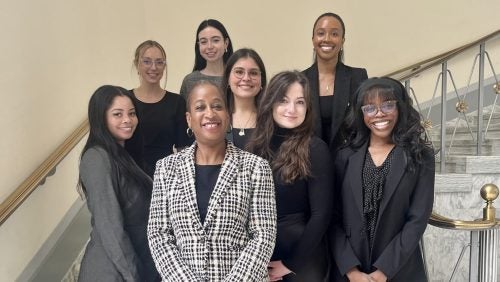
Prof. George and some REEL Clinic student attorneys (from left to right): Taylor-Ryan Nedd, Samantha Moan, Alex Rahill, Alex Smith, Tessa Giordano, Mathilde Pierre, and Rhema Brodie-Mends) attend a hearing on Capitol Hill hosted by the U.S. House Education & Workforce Committee.
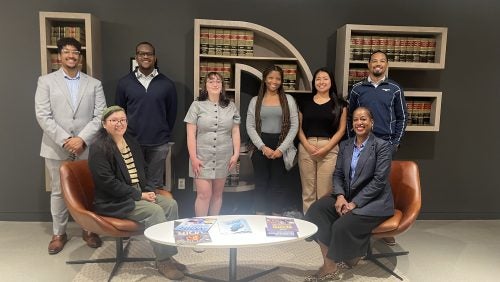
REEL Clinic director Prof. Janel George and Clinical Teaching Fellow Prof. Sophia Tan and REEL Clinic student attorneys (from left to right Hamza Atumah, Olukorede Esan, Siena Hohne, Mecca Aikens, Cynthia Garcia, and Nicholas Fox) visit the Washington, DC, offices of the NAACP Legal Defense and Educational Fund, Inc., and present their research findings about culturally inclusive curriculum (Fall 2024 cohort).
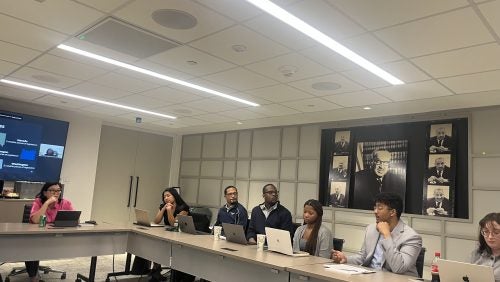
REEL Clinic student attorneys present their findings about culturally inclusive curriculum with LDF staff (from left to right: Cynthia Garcia, Nicholas Fox, Olukorede Esan, Mecca Aikens, Hamza Atumah, and Siena Hohne).
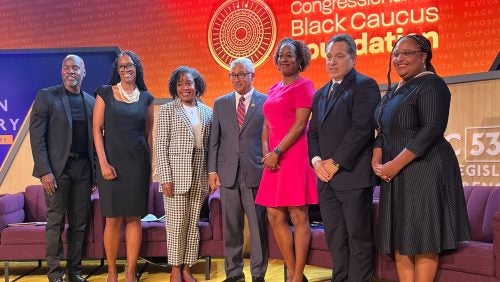
Prof. George joins a panel hosted by House Education and Workforce Committee Democratic Ranking Member Robert C. "Bobby" Scott to discuss education at the Congressional Black Caucus Foundation's Annual Legislative Conference (ALC).
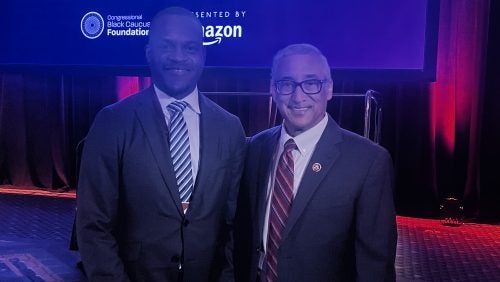
REEL Clinic student attorney Olukorede Esan with Rep. Scott at the CBCF's ALC.
What does racial equity mean?
Racial equity encompasses acknowledging the ways historic discrimination and white supremacy have impacted the status of people of color in the United States. In the historic context of education in the U.S., this includes recognition of the existence of laws prohibiting enslaved Black people from learning to read or write, the forced assimilation and subjugation of Native American students through residential schools, exclusion of Latinx students from education, and the fabrication of the “Model Minority Myth” that obscures the needs of Asian American students. Historic discrimination has very real impacts on contemporary educational inequities, particularly because inequality is embedded into institutions and systems (like the legal and legislative systems). Recognizing that discrimination is not a vestige of the past, but persistent and malleable, is vital to identifying and ultimately eradicating racial inequality in education. Equity does not demand that all students have the same things, but—particularly given historic and current discrimination—that minoritized students are provided with the supports and services that they have been (and are being) deprived of in order to thrive and succeed in school and beyond.
What is legislative lawyering?
Legislative lawyers are essentially creative problem-solvers who draw upon a range of resources—including legal research, legislative history, and public narrative—to devise innovative and effective policy interventions to address a range of problems. There are several avenues that legislative lawyers can take to achieve client goals—including coalition-building, public testimony, white papers, and meetings with elected officials. Student attorneys in the Clinic act as legislative lawyers on behalf of a range of clients to advance racial equity in education at the local, state, and federal levels. Student attorneys collaborate with clients and other partners in pursuit of this mission.
